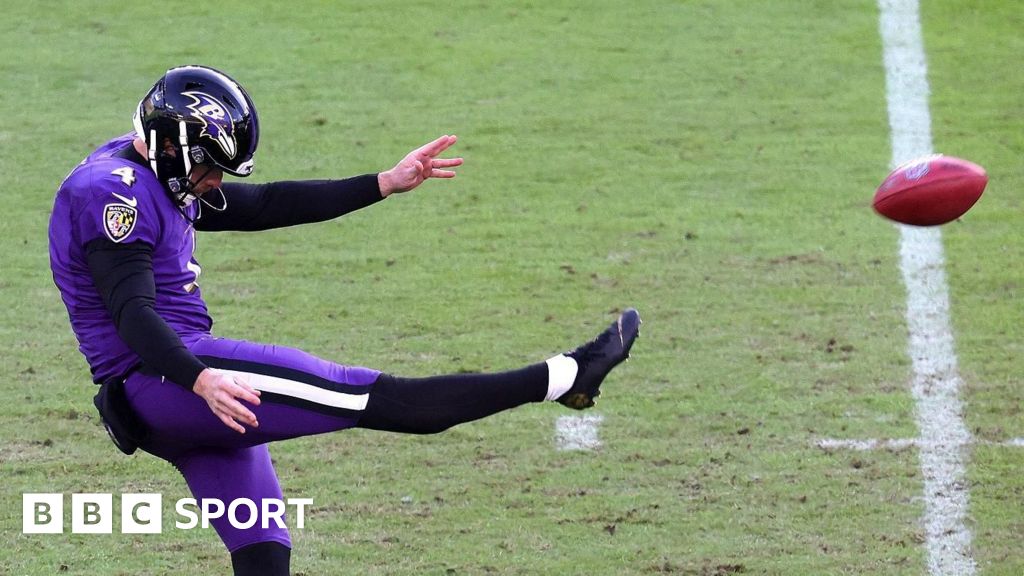NFL: How Sam Koch changed punting with ‘mis-kicks’

To understand what Koch did, you need to know what punting was supposed to look like.
In American football, kicking and punting are different.
Kicking refers to field goals and kick-offs, when the ball is kicked from the ground to score points or to begin the game. Punting, meanwhile, refers to the act where a team give back possession when a player kicks the ball from his hands as far into the opponents’ half as possible.
Traditionally, punters kicked ‘turnover’ balls which spiralled through the air – the benefit being they travel further. The negative, however, is that the flight path is predictable and easier for the receiving player to catch.
“The philosophy of punting is – and always has been – to punt the ball as high as you can, to allow your team to get down there and force the punt returner to have a fair catch,” says Randy Brown, kicking coach with the Baltimore Ravens.
A fair catch is when the player receiving the ball is entitled to take the catch without interference, but, once it is caught, the ball is dead and they cannot attempt to gain any yards.
Koch’s Ravens were facing the Pittsburgh Steelers and one of their main attractions, Antonio Brown, was the best punt returner in the league.
The Ravens needed to try something bold, so they decided Koch would deliberately mis-kick balls.
Directing his hips one way, Koch would shape to kick it left or right but cut across the ball and slice it in the other direction. He would strike ‘knuckleballs’, where rather than the ball spiralling through the air cleanly, it would wobble erratically.
And, crucially, he would employ the ‘drop-punt’, a technique predominately used in Aussie Rules football, and until this point only in very specific instances in American football, where the ball tended to be punted so that it turned end-over-end.
Balls would travel fewer yards but give the receiver less time to react and prepare his return.
And it worked.
Koch punted six times to Brown in that match, forcing four fair catches, with the other two punts being left alone to roll out of bounds.
“We told Sam, ‘put the ball on the ground as quickly as you can’,” says Randy Brown. “Rather than hitting a ball that has a five-second hang time, our goal was to hit one with three and a half.
“What we were doing was going totally against the grain.”
Koch adds: “They’d look like they were mis-hits and crowds would boo, but we knew what we were executing.”
In a game of inches, Koch’s stats improved by yards. Net yardage is the defining statistic for a punter. In 2013 Koch’s net yardage was 38.9, a figure good enough for 22nd in the league. In 2014 it was 43.2, the best in the league.
“It was very exciting,” reminisces Koch. “We created something that’s totally against the norm for how many years.”
For Brown, it was “a eureka moment”.
“If you’re going to introduce something like this on a Sunday night in front of 20 million-plus people, you don’t want your player to be embarrassed and, as a coach, you don’t want to be embarrassed,” he says.
“This wasn’t some pre-season game. From a coaching standpoint, it was the confidence in the player to execute the skill on the big stage.”
Related
Sports Medicine Report: Sporting heads east to take on D.C.…
Sports Medicine Report is SportingKC.com’s look at the latest health update around the team ahead of upcoming matches and is pre
😔 João Palhinha’s Bayern Munich nightmare continues
João Palhinha's 2024/25 season has been marred by injury and the Portuguese midfielder had another setback against Bochum.Palhinha was sent off in the 43rd min
Which baseball player could excel at another sport? MLB player…
MLB.com and its beat writers surveyed over 100 players asking them which MLB player would excel at another sport and two Cincinnati Reds players ranked in the T
Raiders had no interest in Aaron Rodgers
When tracking down the details of the Raiders’ latest contract with Maxx Crosby on Thursday, I had a question for our sou











